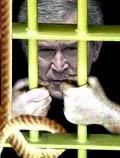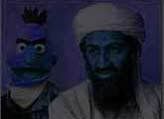| Find |
Friday, 15 February 2008
There's no surge in freedom for Iraqi women in Basra
The State of the Union speech has evolved into a pageant that includes a relatively new tradition of the president publicly acknowledging invited guests. These guests usually are props intended to endorse the president's policies.
So, in 2005 in defense of the Iraq invasion, President Bush drew the world's attention to Safia Taleb al-Suhail, the daughter of an Iraqi tribal leader killed by Saddam Hussein's intelligence forces for plotting a coup against Saddam.
When Safia held aloft for the cameras an ink-stained finger to indicate that she had voted in the Iraqi national elections engineered by the Bush administration, many in the chamber cheered wildly and wagged their fingers back in solidarity.
It was great political theater.
"Three days ago in Baghdad, Safia was finally able to vote for the leaders of her country," a beaming President Bush said.
But on this day three years later, when millions of American women are contemplating cards, chocolates and flowers, women in Basra, Iraqi's second largest city, are under siege.
In Basra, five years after the U.S.-led invasion, women find themselves under the thumbs of religious fundamentalists who, in the absence of Saddam's iron-fisted secular rule, are killing them in front of their children. Some have been kidnapped, raped, strangled and beheaded, their limbs chopped off for purported violations of the Islamic faith. Women who under Saddam worked outside of their homes have been driven back inside, and if they dare to come out, wearing make-up or wearing a headscarf deemed too brightly colored, they very well could die.
"We don't know who to be afraid of," one Basra woman said in a CNN report. "Maybe it's a friend or a student you teach. There is no break, no security. I don't know who to be afraid of."
Unfortunately, there's little to no protection.
Posted at
16:19
![]()
Post Title: There's no surge in freedom for Iraqi women in Basra
![[Zionazis-1.jpg]](https://blogger.googleusercontent.com/img/b/R29vZ2xl/AVvXsEg_x8DOGucgHQmfJJujuK_oYJdxhEnskhQqt-Og7lSk52HeaDQYzW8NQWfdpHmPgj_FJN0jJ3tz1prR1jVZHdHky2HDQxxcs4LVxX0DtAt3fG0sfRr6MDx7Sz8cJNjl0k0RS9TbCjangQ/s1600/Zionazis-1.jpg)




